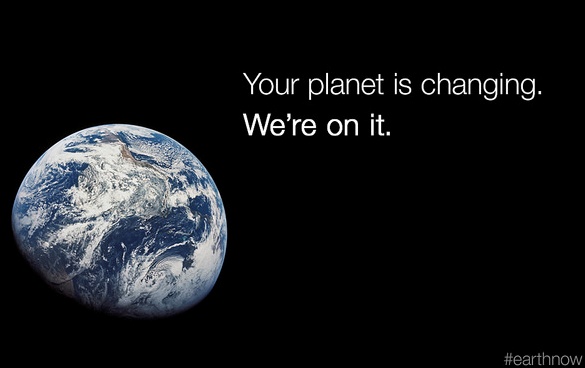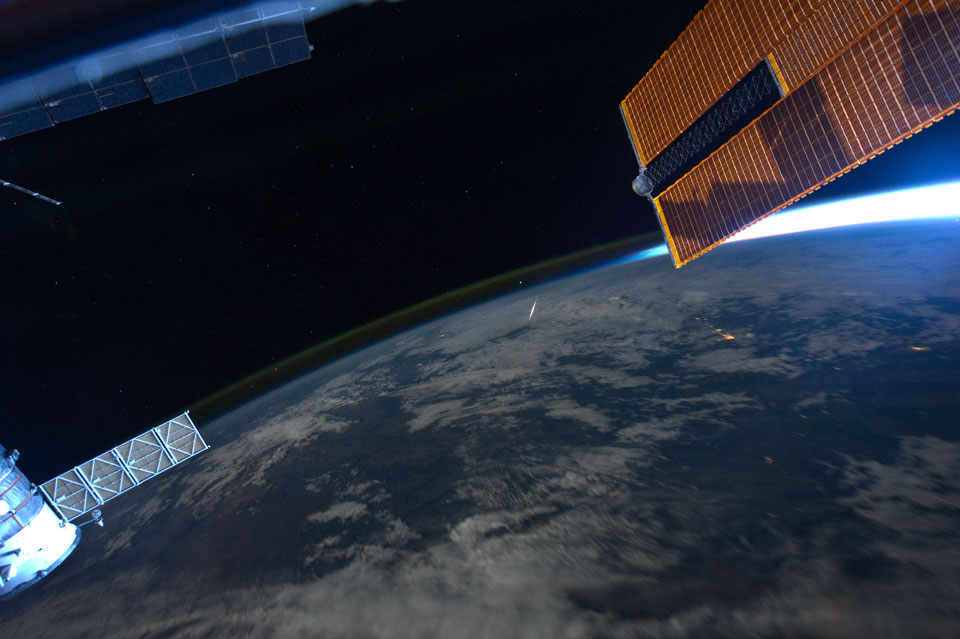PlanetCitizen: Difference between revisions
Siterunner (talk | contribs) |
Siterunner (talk | contribs) |
||
| Line 4: | Line 4: | ||
'''An API for the Planet''' [http://t.co/dfsywixUg6 #PlanetLabs Open Source Conference keynote] #Earth360 #PlanetCitizen | '''An API for the Planet''' [http://t.co/dfsywixUg6 #PlanetLabs Open Source Conference keynote] #Earth360 #PlanetCitizen | ||
A new generation of small satellite, start-up companies is changing the way we observe and study our planet. A coming new era using the tools of the digital age and Internet connectivity | A new generation of small satellite, start-up companies is changing the way we observe and study our planet. A coming new era of #planetearth exploration, using the tools of the digital age and Internet connectivity, will make it possible to link up worldwide and to see Planet Earth, our home, in new ways, ways that will change our perceptions of who we are and how we look out at our shared, common future. | ||
Earth science data | Earth science data are beginning to flow and, in historic ways, are being openly, publicly distributed far beyond the restrictive policies of previous times when military and communication satellites and their closed-loop systems dominated space and space-earth data. | ||
Today #earthsciences are at the cusp of a rich new world of information provided by micro- and mini-satellites. As we share these new planet images, data, experiences and the realizations that are coming that take us to new ways of seeing and cognitively 'understanding', we can be certain of a new, growing awareness of our planet and our 'citizenship' together. | |||
Even now, we have inklings of what is coming. Let's look at one called '''OCO-2'''. With the launch of OCO-2, a "game changer", in the summer of 2014, the data of #Earth360 will grow in unprecedented ways as this first 'orbiting observatory' of global warming conditions takes to space and begins to report home -[https://twitter.com/IamOCO2 I am OCO-2.] | |||
Although the Orbiting Carbon Observatory is just the beginning, the future of looking at our borderless-from-space globe and the coming generations of common-travel to space, and space-imaging opening up amazing views, with 3D and big-screens and home theaters, and educational and scientific information about our communities being shared, and linked to, and distributed by the net, we will soon be watching the smiles of more and more citizens of the planet. | |||
So, first steps first... | |||
Ω | Ω | ||
Before we look at the new players, | Before we look at the new players, let's look at the astro-space establishment asking you, yes you, to jump in. It's sort of NASA's version of ''crowdsourcing''. They're getting digital. Ready? Are you interested in using your digital skills to help the government/NASA with environmental security? Perhaps you might start here - [http://www.greenpolicy360.net/w/NASA_EarthSciences,_Challenges_Public_to_Join_In '''The NEX Challenge'''] | ||
Add your talent to the grand project of seeing with an [http://www.earthpov.com '''EarthPOV'''] -- so that we can make informed decisions and policy... [http://www.greenpolicy360.net/mw/images/You_can_manage_only_what_you_can_measure_Dr_David_Crisp%2C_OCO-2%2C_June_2014_m.jpg] | Add your talent to the grand project of seeing with an [http://www.earthpov.com '''EarthPOV'''] -- so that we can make informed decisions and policy... [http://www.greenpolicy360.net/mw/images/You_can_manage_only_what_you_can_measure_Dr_David_Crisp%2C_OCO-2%2C_June_2014_m.jpg] | ||
Revision as of 20:09, 24 August 2014
Planet Citizen
An API for the Planet #PlanetLabs Open Source Conference keynote #Earth360 #PlanetCitizen
A new generation of small satellite, start-up companies is changing the way we observe and study our planet. A coming new era of #planetearth exploration, using the tools of the digital age and Internet connectivity, will make it possible to link up worldwide and to see Planet Earth, our home, in new ways, ways that will change our perceptions of who we are and how we look out at our shared, common future.
Earth science data are beginning to flow and, in historic ways, are being openly, publicly distributed far beyond the restrictive policies of previous times when military and communication satellites and their closed-loop systems dominated space and space-earth data.
Today #earthsciences are at the cusp of a rich new world of information provided by micro- and mini-satellites. As we share these new planet images, data, experiences and the realizations that are coming that take us to new ways of seeing and cognitively 'understanding', we can be certain of a new, growing awareness of our planet and our 'citizenship' together.
Even now, we have inklings of what is coming. Let's look at one called OCO-2. With the launch of OCO-2, a "game changer", in the summer of 2014, the data of #Earth360 will grow in unprecedented ways as this first 'orbiting observatory' of global warming conditions takes to space and begins to report home -I am OCO-2.
Although the Orbiting Carbon Observatory is just the beginning, the future of looking at our borderless-from-space globe and the coming generations of common-travel to space, and space-imaging opening up amazing views, with 3D and big-screens and home theaters, and educational and scientific information about our communities being shared, and linked to, and distributed by the net, we will soon be watching the smiles of more and more citizens of the planet.
So, first steps first...
Ω
Before we look at the new players, let's look at the astro-space establishment asking you, yes you, to jump in. It's sort of NASA's version of crowdsourcing. They're getting digital. Ready? Are you interested in using your digital skills to help the government/NASA with environmental security? Perhaps you might start here - The NEX Challenge
Add your talent to the grand project of seeing with an EarthPOV -- so that we can make informed decisions and policy... [1]
Observe, consider, act - "The Big Picture"
Ω
August 11, 2014
SETI Institute: Citizens of planet Earth typically watch meteor showers by looking up. But this remarkable view, captured on 8/13/11 by astronaut Ron Garan, caught a Perseid meteor by looking down. From Garan's perspective onboard the ISS orbiting at an altitude of about 380 kilometers, the Perseid meteors streak below. The glowing comet dust grains are traveling at about 60 kilometers per second through the denser atmosphere around 100 kilometers above Earth's surface. [2]
Science News from space [3] Come to think of it - Where is Bruce Dern these days? Silent Running and...
Douglas Trumbull's VFX vision in Silent Running and beyond continues on in our memory banks [4] [5] [6] [7]
Ω

